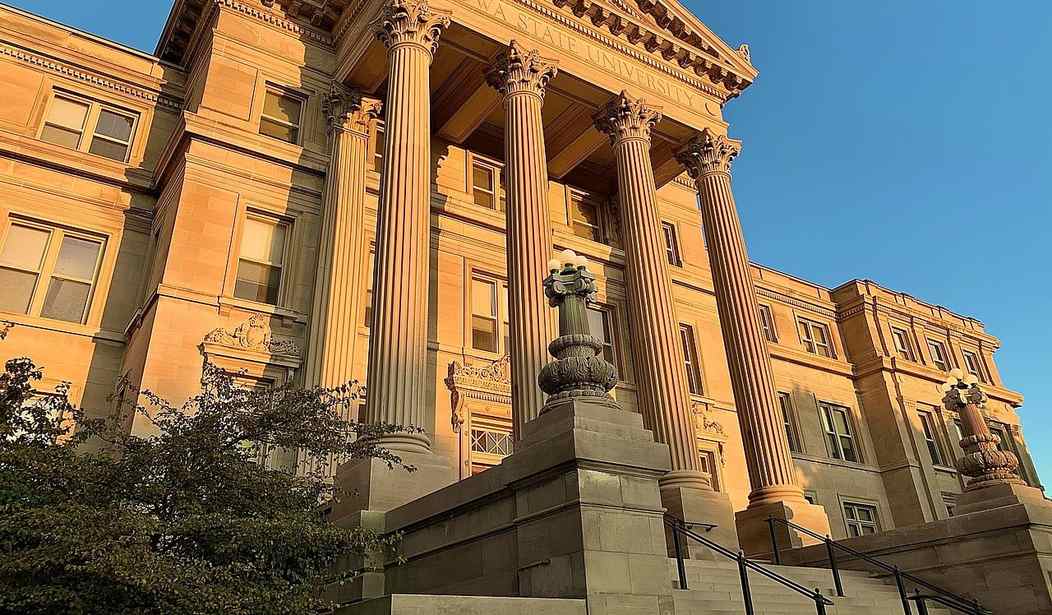Iowa State University’s policies restricting political action on campus violate the First Amendment guarantee of free speech, effectively muzzling students on the eve of the Iowa caucuses, according to a new lawsuit filed Thursday by the free speech organization Speech First. The university has prevented students from writing messages in chalk and from sending emails to support campaigns or ballot initiatives. The university also maintains an Orwellian Campus Climate Reporting System (CCRS) to police “bias incidents” that the school claims reflect “a similar motivation as hate crimes.”
The university’s policies — and the lawsuit challenging them — will likely impact the Story County caucus when the first Democratic primary contest takes place on February 3.
“The Story County caucuses have historically been decided by a few hundred votes, and ISU boasts a student body of over 33,000 students – so the difference of several hundred politically-engaged students certainly has the potential to influence the outcome,” Nicole Neily, founder and president of Speech First, told PJ Media on Tuesday.
“Historically, students have learned about on- and off-campus candidate events through chalking and been able to attend – or organize counter-programming – accordingly. By silencing the advertising of these events, students are missing out on the opportunity to participate in civic participation,” she argued.
ISU banned most forms of chalking — writing on sidewalks with chalk — after a group called “Students Against Racism” complained to the university about offensive messages last fall. Under the new policy, students may only use chalk to advertise events for school-sanctioned clubs.
According to the lawsuit, this “chalking policy violates Iowa law, which requires that ‘[a] member of the campus community who wishes to engage in noncommercial expressive activity in outdoor areas of campus shall be permitted to do so freely,’ with exceptions not applicable here.”
In addition to the chalking policy, ISU maintains an Acceptable Use of Technology Resources Policy, which applies to students’ personal computers, devices connected to the university’s internet service, and their university-provided email accounts. Under the policy, students may not send “email[s] from a university account to solicit support for a candidate or ballot measure, or otherwise us[e] email systems in a concerted effort to support a candidate or ballot measure.”
According to the lawsuit, this policy places content- and viewpoint-based restrictions on speech, in violation of the First Amendment.
“Students who engage in political debates or volunteer for campaigns also commonly use emails to communicate with other students. Since students often seek out the views of their peers, student-to-student emails are an effective means of political speech, organization, and association,” Neily told PJ Media. “Interestingly, the policy prohibits emails that ‘support’ candidates or ballot measures, but not emails that oppose candidates or ballot measures. Thus, a student who emails ‘Vote Bernie’ will face discipline by the University, while a student who emails ‘Don’t Vote Bernie’ will not.”
Finally, the lawsuit claims that ISU’s CCRS — originally called the “Campus Climate Response Team” and based off of similar bias-response teams at other schools — also unconstitutionally chills students’ free speech.
The CCRS investigates “bias incidents,” which the university claims “reflect a similar motivation as hate crimes.” ISU defines “hate crimes” as “crimes committed against a person or their property ‘because of the person’s race, color, religion, ancestry, national origin, political affiliation, sex, sexual orientation, age, or disability, or the person’s association with a person” in one of those categories. Examples of “bias incidents” include actions that someone perceives as “demeaning,” “taunting,” “bullying,” “verbal harassment,” or “intimidation.”
In the past, the university used the phrase “build the wall” as an example of a bias incident. Students reported written support for Rep. Steve King (R-Iowa), Gov. Kim Reynolds (R-Iowa), and President Donald Trump as bias incidents in 2018. When the student government discussed a bill allowing student groups to limit their membership based on “the group’s beliefs and standards,” students reported that as a bias incident because they claimed it involved “discrimination against the LGBT community.”
In 2017, the Foundation for Individual Rights in Education found that bias-response teams lead to “a surveillance state on campus where students and faculty must guard their every utterance for fear of being reported to and investigated by the administration.” That report further warned that “the posture taken by many Bias Response Teams is all too likely to create profound risks to freedom of expression, freedom of association, and academic freedom on campus.”
The students Speech First is representing in the lawsuit support Trump, but ISU’s policies also restrict the speech of Democrats organizing for the Iowa caucuses. Free speech is not a partisan issue.
Follow Tyler O’Neil, the author of this article, on Twitter at @Tyler2ONeil.









Join the conversation as a VIP Member